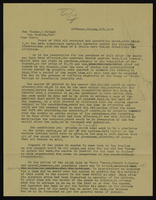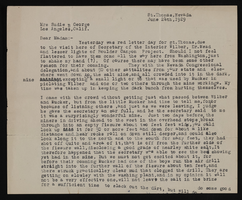Search the Special Collections and Archives Portal
Search Results
Jamey Stillings Photographs
Identifier
Abstract
The Jamey Stillings Photographs (2009-2024) is primarily comprised of photographs taken by professional photographer, Jamey Stillings documenting various infrastructure projects in the region. The Mike O’Callaghan-Pat Tillman Memorial Bridge project at the Hoover Dam depicts the construction of the Mike O’Callaghan-Pat Tillman Memorial Bridge from 2009 to 2012. The Ivanpah Solar Electric Generating System project depicts aerial views of Ivanpah Solar in the Mojave Desert of California from 2010 to 2014. The Crescent Dunes Solar project consists of a range of aerial and ground-based work documenting SolarReserve's Crescent Dunes Solar near Tonopah, Nevada, from 2014 to 2015. The
Archival Collection

Correspondence, Levi Syphus to Thomas Toland
Date
Archival Collection
Description
Text

Correspondence, Levi Syphus to Sadie George
Date
Archival Collection
Description
Text
Fallman Family Papers
Identifier
Abstract
The Fallman Family Papers (approximately 1950-2005) consist of correspondence, newspaper clippings, photographic prints and slides, scrapbooks, and pamphlets from James and Ima Fallman and their daughter, Janice. The correspondence primarily relates to James and Ima Fallman and chronicles Ima's involvement with the Francisco Garces chapter of the Daughters of the American Revolution (DAR), James's work as a bartender in Las Vegas, Nevada, and awards he received during World War II. The newspaper clippings mention either James Fallman or his daughter, Janice, and her involvement with the Las Vegas High School Rhythmettes dance team. The majority of materials from Janice describe her school days at Las Vegas High School and events participated in as a child and young adult.
Archival Collection
Dunes Hotel and Casino Records
Identifier
Abstract
The Dunes Hotel and Casino Records are comprised of administrative, publicity, and entertainment materials documenting the history of the Dunes Hotel and Casino in Las Vegas, Nevada from the years 1954 to 1992. Included are correspondence, contracts, photographs, hotel budgets, and an early aerial photograph of the property. The material provides a significant amount of historical documentation of the hotel that was long known to tourists and residents as the "the Miracle in the Desert."
Archival Collection
Clinton Wright Photographs
Identifier
Abstract
The Clinton Wright Photographs (1964-2018) contains black-and-white photographic negatives of various sizes, dating from 1964 to 1971. The images document the Black experience in Las Vegas, Nevada during the 1960s and 1970s, and capture scenes of everyday life in the historic Black neighborhood known as the Westside, social events such as weddings and parties, and events hosted by local churches. The collection also contains a photograph of Clinton Wright from 2017 when he visited the University of Nevada, Las Vegas Special Collections and Archives, and a memorial program for his wife, Joyce Wright, who passed away in 2018.
Archival Collection
Southern Nevada Historical Society Photograph Collection on Basic Magnesium, Inc.
Identifier
Abstract
The Southern Nevada Historical Society Photograph Collection on Basic Magnesium, Inc. contains photographs of the construction of Basic Magnesium Inc.'s plants and buildings from 1941 to 1942. The photographs primarily depict aerial views of the plant site and various buildings, including the administration building, tent camp, chlorination buildings, electrolysis facilities, electrical distribution systems, and warehouses. The photographs also depict Lake Mead and the early buildings in Henderson, Nevada.
Archival Collection
Dunes Hotel Photograph Collection
Identifier
Abstract
The Dunes Hotel Photographs (1950-1993) consist of administrative, publicity and entertainment images documenting the history of the Dunes Hotel and Casino in Las Vegas, Nevada. In addition to materials focusing on day-to-day activities at the hotel (correspondence, contracts, personnel, budgets, etc.) the collection provides insight into the hotel’s entertainment and public relations activities. Although there are chronological gaps in the collection, particularly during the later years of the Dunes (1970s-1990s), it provides a significant amount of historical documentation on the famed Strip hotel that was long known to tourists and residents alike as the “the Miracle in the Desert.”
Archival Collection

